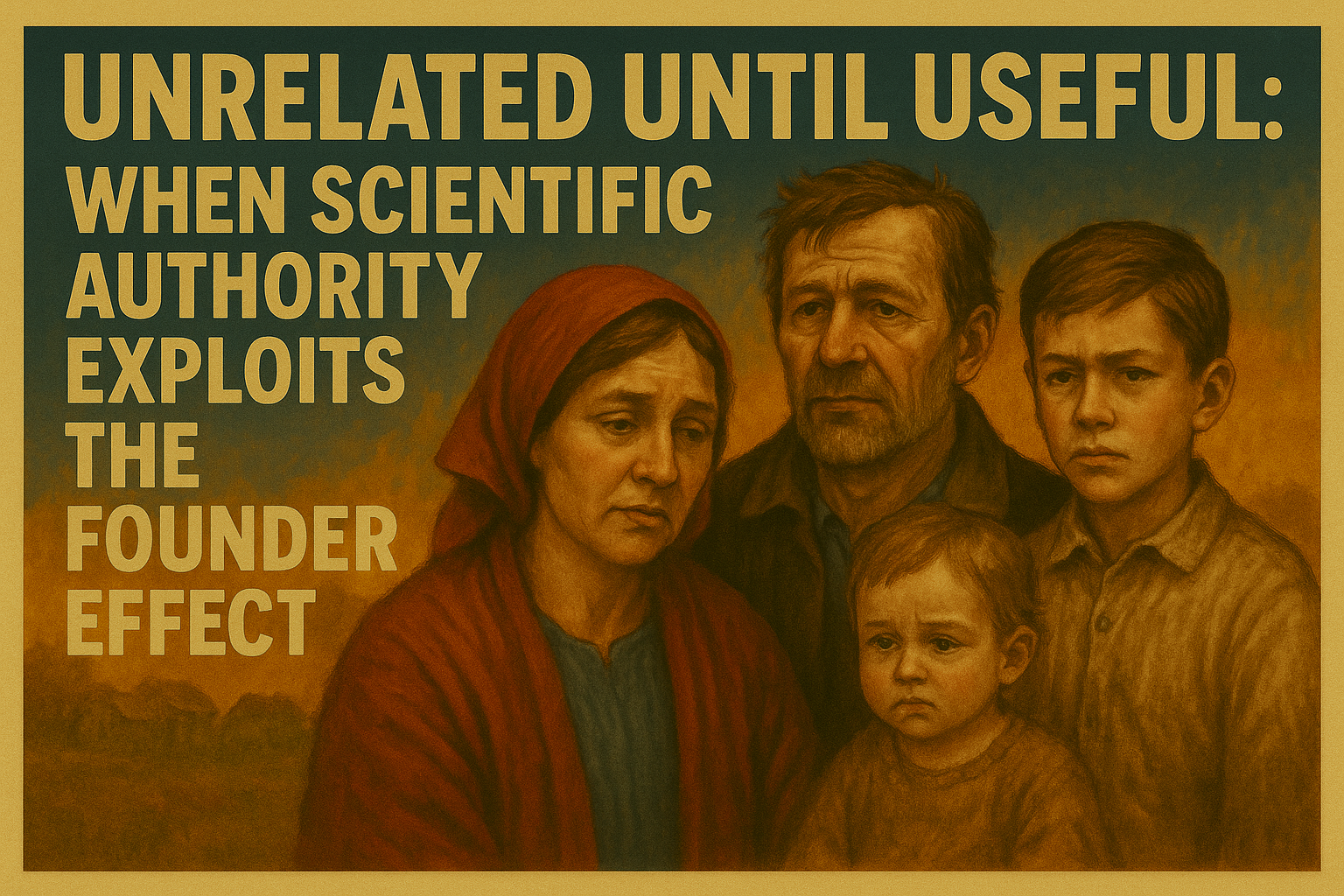How a high-profile genetic study twisted Newfoundland’s isolation into a research tool—then denied its consequences.
Memorial University researchers used the island’s deeply related population to run a genome-wide cancer study, labeling patients “unrelated” despite drawing exclusively from a founder-effect region known for inherited disease. While touting patient advocacy, the team waived consent, denied public access to the data, and ignored the very ancestral ties that made the study possible—exploiting genetic consistency while erasing the people behind it.
Introduction
In a peer-reviewed article published in PLOS One in June 2025, researchers from Memorial University conducted what they touted as the first genome-wide SNP-SNP interaction analysis for colorectal cancer prognosis. The study, based entirely on a patient cohort from Newfoundland and Labrador, proudly declared that the 430 individuals included were unrelated Caucasian patients.¹
That phrase might seem like a minor technical note—unless you know Newfoundland. Then it reads more like a punchline.
Because when your entire sample is drawn from one of the most genetically inbred, bottlenecked, and demographically stable populations in North America, “unrelated” becomes less a scientific claim and more an ethical sleight of hand.
The Founder Effect They Forgot to Mention
Newfoundland has long been recognized as a classic example of a founder effect population—a small group of settlers, isolated by geography, culture, and time. In certain rural enclaves, the same few surnames have echoed across centuries. Entire outports were often founded by fewer than a dozen families, with limited migration in or out for generations.²
This isn’t speculation—it’s documented. Studies have shown that Newfoundland exhibits long runs of homozygosity and limited haplotype diversity, especially in the Irish and French-descended regions.³ In other words, people are genetically similar, whether they know it or not.
So when the authors of this study state they excluded only 1st-, 2nd-, and 3rd-degree relatives before declaring the rest unrelated, they are playing a dangerous game: ignoring deep ancestral ties simply because they fall beyond a paper pedigree.
No kinship matrix. No genomic PCA correction. No acknowledgement of population stratification. Just a claim—and a hope no one local would question it.
A Familiar Syndrome, A Forgotten Truth
If you’re from Newfoundland’s French Shore—or places like Sandy Point—you may already know the name: Alldrice syndrome. Sometimes called Sandy Point syndrome, it’s a rare neurological condition passed down in French-descended families along the west coast of Newfoundland. It is believed to follow an autosomal recessive inheritance pattern, meaning a child must inherit the same defective gene from both parents—who are often unaware they’re distantly related.⁴
This condition doesn’t show up randomly across Canada. It clusters—because the people carrying the gene are related, whether they know it or not.
And that’s the piece the PLOS One study conveniently overlooks. They want the genetic stability of this place—our shared ancestry, our deep familial lines—but not the consequences. They want “unrelated” test subjects from a province where even rare diseases are inherited locally.
If Alldrice syndrome exists because of our relatedness, how can a genome-wide cancer study ignore it and claim independence?
That’s not science. That’s story control.
The Problem with Genetic Echo Chambers
This matters because gene-gene interaction studies like this rely on unrelatedness to function. Relatedness inflates associations. It can generate false positives, obscure true interactions, and make weak data look stronger than it is.
But in Newfoundland, you don’t need to be first cousins to share a chunk of genome. You just need to be from the same village. And most of these patients were. Yet the study assumes that removing immediate kin magically purifies the dataset.
If you're doing genome-wide interaction modeling in a place where third cousins are statistically the norm, and you fail to control for it, then your findings are structurally biased before they hit the page.
“Calling 430 Newfoundlanders unrelated because they don’t share grandparents is like calling a pack of siblings unrelated because they live in different houses.”
Advocacy or Extraction?
Lead author Sevtap Savas often claims she advocates on behalf of cancer patients in Atlantic Canada.⁵ Yet the data used in the study is not publicly accessible, and the patients involved were not consented for public genomic studies in the way the paper implies.
The genetic data comes from the Newfoundland Familial Colorectal Cancer Registry (NFCCR), a long-standing resource controlled by Dr. Patrick Parfrey.⁶ Access is granted only through Memorial University’s research ethics committee, and requests must go through institutional channels. The public cannot request access. And neither can the patients who provided the data.
This isn’t advocacy. It’s data colonialism.
Recruited, Then Reused
The patients in this study didn’t volunteer for a genome-wide SNP interaction analysis. They were recruited into the Newfoundland Familial Colorectal Cancer Registry—a provincial database created to track hereditary cancer risk through family histories and clinical diagnostics.
Most were enrolled years ago through physicians, local clinics, or health authorities—not by researchers with academic publications in mind. Their consent was shaped by trust in the healthcare system, not by any awareness of open-data science or SNP interaction modeling.
They weren’t re-contacted. They weren’t asked. And they weren’t told their genetic identity would be used to model gene-gene interactions in international journals.
This isn’t a semantic quibble—it’s an ethical failure. Consent isn’t permanent. Data collected under one promise can’t be reused indefinitely under another. Especially not when the research pivots from understanding familial cancer risk to testing hypothetical gene interactions—without any return of results or consultation with the communities affected.
The Consent That Wasn’t
The ethics approval for this study waives patient consent under the rationale of secondary data use. But this isn’t secondary analysis. It’s an entirely new genome-wide hypothesis test—one that produced no statistically significant results after correction for multiple comparisons.¹
Still, the paper was published. Why? Because the data itself—not the result—is the product. Newfoundland’s genetic isolation has become a tool for career building. The researchers didn’t need significance. They needed access. And they got it.
The people of this province didn’t give informed consent for that. They were not told that their bloodlines, condensed by centuries of hardship, would become a test tube for research that now pretends their relatedness doesn’t exist.
The Governance Failure
This isn’t just a scientific problem—it’s a governance problem. A public university is using provincial health data to produce internationally published research, but there is no oversight, no community benefit, and no return of findings. The same institutions that block independent researchers from challenging the methodology are the ones issuing press releases about their advocacy.
“In Newfoundland, we are studied because we’re isolated—but erased because we’re related.”
That’s the local paradox in full view.
Conclusion: The Data Miner’s Paradox
This study is a case study in what might be called the Data Miner’s Paradox:
“The same traits that make a population ideal for research are the ones that make its people easiest to ignore.”
In Newfoundland, our genetic consistency is used as a resource—but the moment someone local points out the contradiction, the door slams shut.
They removed third cousins and called it unrelated.
They waived consent and called it ethical.
They published null results and called it advocacy.
But if you sit quietly and read the fine print, the real story becomes obvious:
Newfoundland is unrelated—until it’s useful.
References
[1] Curtis, L., et al. (2025). Genome-wide SNP-SNP Interaction Analysis in a Colorectal Cancer Patient Cohort from Newfoundland. PLOS ONE. Link to article PDF (local archive)
[2] Zhai, G., et al. (2016). Genetic structure of the Newfoundland and Labrador population: founder effects modulate variability. European Journal of Human Genetics, 24, 1407–1415. https://www.nature.com/articles/ejhg2015256
[3] Evans, J.P., et al. (2003). The Newfoundland population: A unique resource for genetic investigation of complex diseases. ResearchGate Summary. https://www.researchgate.net/publication/10617034_The_Newfoundland_population
[4] Allderdice, P. et al. (1996). Neurological syndrome in descendants of French settlers in Sandy Point, NL: A recessive disorder with regional prevalence. Summary via Prezi. https://prezi.com/t2k_nitvqcwq/allderdice-syndrome
[5] Savas Lab, Memorial University (2023–2025). Public advocacy claims and research communications. https://www.med.mun.ca/Medicine/Faculty/Savas,-Dr--Sevtap.aspx
[6] Newfoundland Familial Colorectal Cancer Registry (NFCCR), Memorial University. https://www.med.mun.ca/NFCCR/Home.aspx

